七年级下外研版英语
- 格式:doc
- 大小:144.50 KB
- 文档页数:13

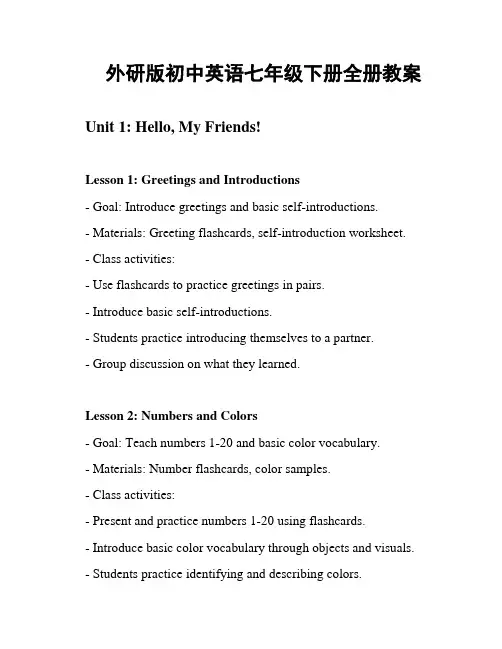
外研版初中英语七年级下册全册教案Unit 1: Hello, My Friends!Lesson 1: Greetings and Introductions- Goal: Introduce greetings and basic self-introductions.- Materials: Greeting flashcards, self-introduction worksheet. - Class activities:- Use flashcards to practice greetings in pairs.- Introduce basic self-introductions.- Students practice introducing themselves to a partner.- Group discussion on what they learned.Lesson 2: Numbers and Colors- Goal: Teach numbers 1-20 and basic color vocabulary.- Materials: Number flashcards, color samples.- Class activities:- Present and practice numbers 1-20 using flashcards.- Introduce basic color vocabulary through objects and visuals. - Students practice identifying and describing colors.- Reinforce learning with a color-matching game.Unit 2: My Family and My HomeLesson 1: Family Members- Goal: Learn how to talk about family members in English.- Materials: Family tree diagram, family member flashcards.- Class activities:- Introduce family member vocabulary using flashcards.- Present a family tree diagram and discuss relationships.- Practice asking and answering questions about family members. - Students create their own family tree diagrams.Lesson 2: My Home- Goal: Describe rooms and furniture in a house.- Materials: House diagram, furniture flashcards.- Class activities:- Introduce vocabulary for different rooms and furniture items. - Present a house diagram and label the rooms.- Students practice describing their own homes.- Group activity: Designing their dream house using English vocabulary.Unit 3: My School LifeLesson 1: School Subjects- Goal: Introduce school subject vocabulary.- Materials: Subject flashcards, timetable template.- Class activities:- Present and practice vocabulary for school subjects.- Introduce a typical school timetable.- Students create their own timetables and discuss with partners.- Group activity: Role-play a school day schedule.Lesson 2: School Facilities- Goal: Learn vocabulary for different facilities in a school.- Materials: School map, facility flashcards.- Class activities:- Introduce a school map and label the facilities.- Students describe their school environment.- Group activity: Design an ideal school using English vocabulary.Unit 4: Hobbies and InterestsLesson 1: Hobbies- Materials: Hobby flashcards, hobby survey worksheet.- Class activities:- Present and practice vocabulary for different hobbies.- Small group activity: Creating a poster about their favorite hobby.Lesson 2: Sports and Activities- Goal: Learn vocabulary related to sports and activities.- Materials: Sports flashcards, activity pictures.- Class activities:- Present and practice vocabulary for different sports and activities.- Students describe their favorite sports and activities.- Pair activity: Role-play a conversation about planning a weekend activity.- Group activity: Creating a sports and activities collage.Unit 5: Daily RoutineLesson 1: Daily Activities- Materials: Daily routine flashcards, daily routine chart.- Class activities:- Present and practice vocabulary for daily activities.- Students fill in their daily routine charts and share with partners.- Pair activity: Role-play a conversation about daily activities.Lesson 2: Telling Time- Goal: Learn how to tell time in English.- Materials: Clock flashcards, time worksheets.- Class activities:- Introduce vocabulary for different times on the clock.- Practice telling time using flashcards and worksheets.- Pair activity: Role-play a conversation about scheduling activities.- Group activity: Creating a daily schedule using English vocabulary.。
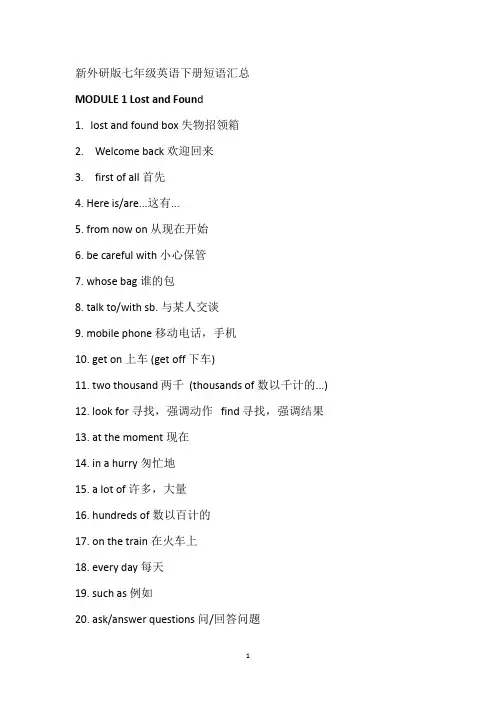
新外研版七年级英语下册短语汇总MODULE1Lost and Foun d1.lost and found box失物招领箱2.Welcome back欢迎回来3.first of all首先4.Here is/are...这有...5.from now on从现在开始6.be careful with小心保管7.whose bag谁的包8.talk to/with sb.与某人交谈9.mobile phone移动电话,手机10.get on上车(get off下车)11.two thousand两千(thousands of数以千计的...)12.look for寻找,强调动作find寻找,强调结果13.at the moment现在14.in a hurry匆忙地15.a lot of许多,大量16.hundreds of数以百计的17.on the train在火车上18.every day每天19.such as例如20.ask/answer questions问/回答问题MODULE2What Can You Do?1.play the+乐器Play the piano弹钢琴2.play+球类Play football踢足球3.ride a bike骑自行车4.speak English well说英语说得好5.would like to do sth.想要做某事-would you like to do sth? --Yes,I’d love to.你愿意做某事吗?是的,我愿意。
6.worry about担心7.get the best score得到最好的分数8.get on well with sb.与某人相处融洽9.teach sb sth教某人某事teach you Chinese10.work very hard学习非常努力11.be sure确信的12.be ready to do sth.准备/乐意做某事13.want to do sth想要做某事need to do sth需要去做…decide to do sth14.make our classroom beautiful使我们的教室美15.be good at sth/v-ing=do well in v-ing/n.擅长做某事16.fly a kite放风筝17.swim well游泳游的好18.what/how about doing做某事怎么样19.choose…as选择作为20.promise to do sth承诺做某事21.help sb do sth=help sb with sth帮助某人做某事22.do cleaning do some shoppingdo some reading do some sightseeingMODULE3Making Plans1.go over复习2.see a movie看电影3.help with the housework帮忙做家务4.have a piano lesson上钢琴课5.at the weekend在周末plans for the weekend6.have a picnic野餐7.on Saturday morning在周六上午8.join us加入到我们中来9.in the park在公园10.do one’s homework做某人的家庭作业11.stay at home alone独自待在家里12.look forward to doing sth盼望做某事13.get up late起床晚14.enjoy oneself=have fun=have a good time玩得愉快15.read a book读书16.May Day(Labor Day)五一劳动节17.on2nd May在五月二日18.go swimming去游泳19.take a walk=go for a walk散步20.collect litter in the park在公园里收集垃圾21.go sightseeing观光22.spend time with family and friends与家人和朋友们一起度过时光23.make some friends结交一些朋友24.on the morning of1st May在五月一日的上午25.go on summer camp去夏令营26.on the beach在海滩上27.listen to music听音乐28.travel around the world环游世界29.play computer games玩电脑游戏30.stay in bed待在床上31.make plans制定计划32.go for a walk去散步MODULE4Life in the future1.in the future将来2.ask questions问问题3.carry lots of books搬许多书4.by Internet通过因特网5.in20years’time在20年后的时间6.be able to do sth能够7.study at home在家学习8.not…any more不再9.get information on the Internet在网上得到信息10.have a lot of homework to do有很多作业要去做11.be like是…样子的e true成真13.free time空闲时间14.traffic jam交通堵塞15.天气类名词为不可数名词16.in spring在春天17.a kind of…一种18.cold wind冷风19.not only…but also…不但…而且…20.as well也,又,用于句末,肯定句21.on farm在农场22.play with sb与…一起23.in the air在空中24.light rain小雨strong/heavy rain大雨25.write down写下,记下26.There will be+n这里将会有….MODULE5Shopping1.clothes shop服装店2.half price半价3.try on试穿try it/them on试穿它/它们4.shop worker店员5.too much+不可数名词太多的…much too+adj太…6.Mother’s Day母亲节Father’s Day7.wait a minute等一下8.Can I help you?=What can I do for you?9.I’d like to buy…10.What size does she take?11.How much is it/are they?12.How much would you like?13.What else would you like?14.I’ll take it.15.Here you are.16.buy sb sth=buy sth for sb17.look fresh look+adj18.pay for付钱19.sb spend time/money on sth花时间钱在某事sb spend time(in)doing sth花时间做某事20.It takes/took sb some time to do sth花费某人多长时间做某事21.change one’s life改变一个人的生活22.go out出去23.online shopping网上购物24.one day一天,用于将来时25.a few days later几天以后,将来时标志词26.no one没有人27.at any time在任何时候28.because of+短语由于…because+句子29.the price of…的价格pare…with…与…对比31.one of the adj+复数名词…中的一个32.save money省钱MODULE6Around Town1.get to sw=arrive in+大地点/at+小地点=reach sw到达2.on the left/right在左边on your right3.in front of在…的前面4.near here在这附近5.go along沿着。
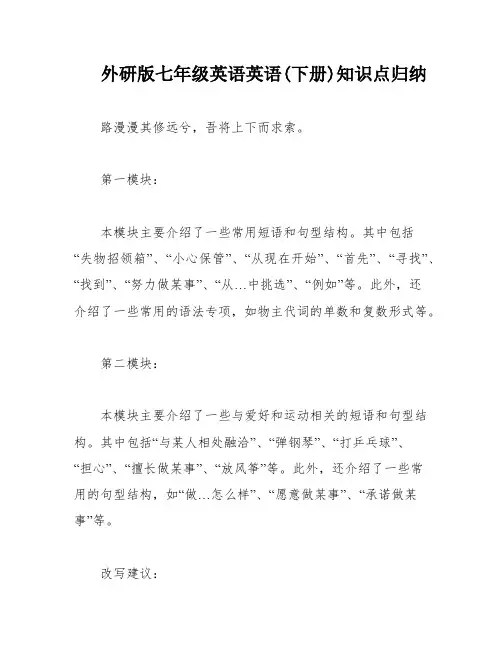
外研版七年级英语英语(下册)知识点归纳路漫漫其修远兮,吾将上下而求索。
第一模块:本模块主要介绍了一些常用短语和句型结构。
其中包括“失物招领箱”、“小心保管”、“从现在开始”、“首先”、“寻找”、“找到”、“努力做某事”、“从…中挑选”、“例如”等。
此外,还介绍了一些常用的语法专项,如物主代词的单数和复数形式等。
第二模块:本模块主要介绍了一些与爱好和运动相关的短语和句型结构。
其中包括“与某人相处融洽”、“弹钢琴”、“打乒乓球”、“担心”、“擅长做某事”、“放风筝”等。
此外,还介绍了一些常用的句型结构,如“做…怎么样”、“愿意做某事”、“承诺做某事”等。
改写建议:第一模块:这一模块介绍了一些常用的短语和句型结构,例如失物招领箱、小心保管、从现在开始、首先、寻找、找到、努力做某事、从…中挑选、例如等。
此外,还介绍了一些常用的语法专项,比如物主代词的单数和复数形式等。
第二模块:这一模块介绍了一些与爱好和运动相关的短语和句型结构,例如与某人相处融洽、弹钢琴、打乒乓球、担心、擅长做某事、放风筝等。
此外,还介绍了一些常用的句型结构,比如做…怎么样、愿意做某事、承诺做某事等。
The journey is long and arduous。
but I will XXX。
In terms of grammar。
it is XXX of using "your"。
"his"。
"her"。
or "its"。
it is best to use specific names or XXX。
Moving on to Module 3.some useful phrases include "have a ic"。
"check one's email"。
and "go over"。

2013新外研版七年级下英语全册课文Module 1 Lost and foundUnit 1 Whose bag is this?Ms Li: Wele back to school everyone! First of all, e and look in thelost and found box! There are a lot of things in it. Whose b agis this?李老师:欢迎大家回到学校!首先,来看看失物招领箱!里面有好多东西。
这是谁的书包?Lingling: Oh sorry! It’s mine. Are my crayons there too?玲玲:哦,对不起!是我的。
我的蜡笔也在里面吗?Ms Li: Are these crayons yours?李老师:这些蜡笔是你的吗?Lingling: Yes, they are and this eraser too. Thank you.玲玲:是的,是我的,还有这块橡皮也是。
谢谢你Ms Li: Whose tapes are these?李老师:这些磁带是谁的?Daming: They’re mine.大明:是我的。
Ms Li: Here’s a purple wallet!李老师:这里有一个紫色的钱包。
Tony: It’s mine. Look! Here’s my name ―Tony‖! Thank you.托尼:它是我的。
看!这里有我的名字“托尼”!谢谢。
Ms Li: You’re wele! Look at this nice watch. Is it yours too,Daming?李老师:不客气!看这块不错的表,也是你的吗,大明?Daming: No, it isn’t. I think it’s Betty’s.大明:不,不是。
我想它是贝蒂的。
Lingling: Yes, it’s hers.玲玲:是的,是她的。
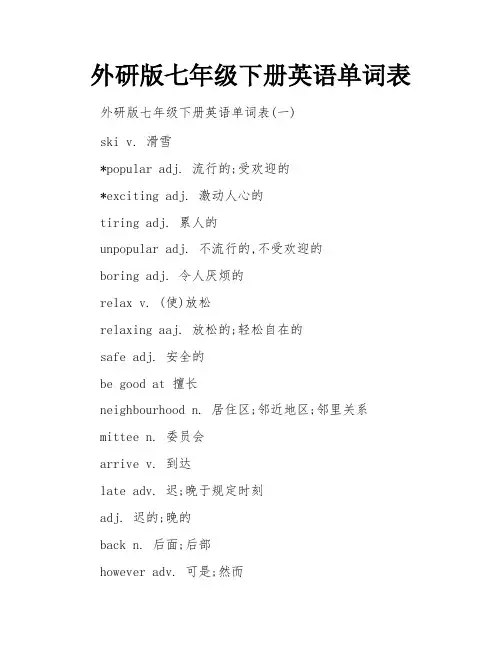
外研版七年级下册英语单词表外研版七年级下册英语单词表(一)ski v. 滑雪*popular adj. 流行的;受欢迎的*exciting adj. 激动人心的tiring adj. 累人的unpopular adj. 不流行的,不受欢迎的boring adj. 令人厌烦的relax v. (使)放松relaxing aaj. 放松的;轻松自在的safe adj. 安全的be good at 擅长neighbourhood n. 居住区;邻近地区;邻里关系mittee n. 委员会arrive v. 到达late adv. 迟;晚于规定时刻adj. 迟的;晚的back n. 后面;后部however adv. 可是;然而*slowly adv. 慢地loudly adv. 大声地;吵闹土眭外研版七年级下册英语单词表(二) founder n. 创建者scientist n.professor n. 教授were 动词be(are)的过去式strict adj. 严格的;严厉的*nice adj. 友好的;令人愉快的friendly adj. 友好的*naughty adj. 淘气的primary adj. 初等的;初级的primary school 小学well-behaved adj.有礼貌的,的hey int. 嘿;喂province n. 省;省份mrs n. 夫人;太太n. 总统*with prep. 带有;和……在一起store n. 商店movie n. 电影*baseball n. 棒球living room*kitchen n. 厨房bathroom n. 浴室bedroom n. 卧室wall n. 墙poster n.;海报garden n. 花园*pond n. 池塘*fish n. 鱼;鱼肉back adv. 回(原处);向后go back 回去somewhere n. 某处;。
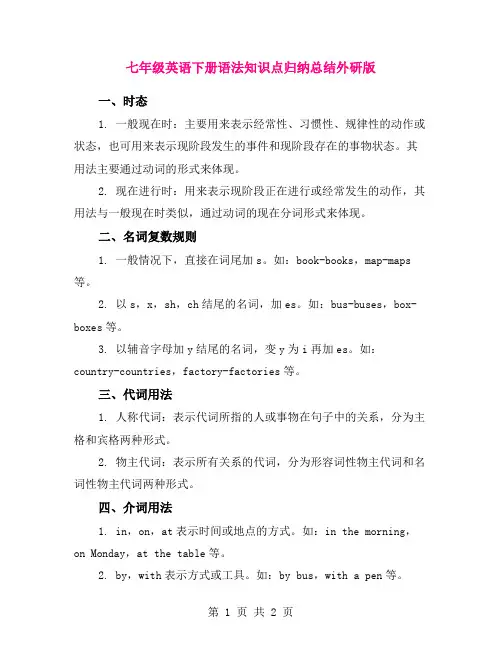
七年级英语下册语法知识点归纳总结外研版一、时态1. 一般现在时:主要用来表示经常性、习惯性、规律性的动作或状态,也可用来表示现阶段发生的事件和现阶段存在的事物状态。
其用法主要通过动词的形式来体现。
2. 现在进行时:用来表示现阶段正在进行或经常发生的动作,其用法与一般现在时类似,通过动词的现在分词形式来体现。
二、名词复数规则1. 一般情况下,直接在词尾加s。
如:book-books,map-maps 等。
2. 以s,x,sh,ch结尾的名词,加es。
如:bus-buses,box-boxes等。
3. 以辅音字母加y结尾的名词,变y为i再加es。
如:country-countries,factory-factories等。
三、代词用法1. 人称代词:表示代词所指的人或事物在句子中的关系,分为主格和宾格两种形式。
2. 物主代词:表示所有关系的代词,分为形容词性物主代词和名词性物主代词两种形式。
四、介词用法1. in,on,at表示时间或地点的方式。
如:in the morning,on Monday,at the table等。
2. by,with表示方式或工具。
如:by bus,with a pen等。
五、形容词比较等级用法1. 比较级:表示两者之间的比较,通过比较级后缀-er或连词than来体现。
2. 最高级:表示三者或三者以上之间的比较,通过最高级后缀-est或副词very,most来体现。
六、一般疑问句及回答一般疑问句是将疑问句以系动词be或助动词do及其时态形式提出,并用简短的肯定或否定回答。
通常用yes或no来回答。
以上就是七年级英语下册语法知识点归纳总结外研版的主要内容,希望对学生们的学习有所帮助。
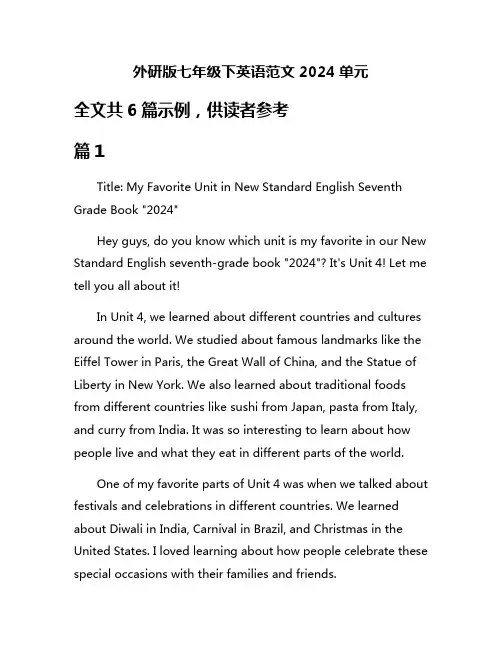
外研版七年级下英语范文2024单元全文共6篇示例,供读者参考篇1Title: My Favorite Unit in New Standard English Seventh Grade Book "2024"Hey guys, do you know which unit is my favorite in our New Standard English seventh-grade book "2024"? It's Unit 4! Let me tell you all about it!In Unit 4, we learned about different countries and cultures around the world. We studied about famous landmarks like the Eiffel Tower in Paris, the Great Wall of China, and the Statue of Liberty in New York. We also learned about traditional foods from different countries like sushi from Japan, pasta from Italy, and curry from India. It was so interesting to learn about how people live and what they eat in different parts of the world.One of my favorite parts of Unit 4 was when we talked about festivals and celebrations in different countries. We learned about Diwali in India, Carnival in Brazil, and Christmas in the United States. I loved learning about how people celebrate these special occasions with their families and friends.Another thing I really enjoyed in Unit 4 was when we practiced our speaking and listening skills by doing role-plays and conversations in pairs. It was so much fun pretending to be tourists asking for directions in a foreign country or ordering food in a restaurant. I also liked watching videos of native speakers talking about their culture and traditions.Overall, Unit 4 was super fun and exciting to learn. I loved exploring different countries and cultures with my classmates and teachers. I can't wait to see what we will learn next in our New Standard English book "2024"!篇2Learners UnitedHello everyone! My name is Lily and I want to tell you all about what we have been learning in our English class. We have been studying Unit 4 in our New Standard Edition Grade 7 English textbook, and let me tell you, it's been so much fun!In this unit, we have been learning all about different countries and their cultures. We have studied countries like Japan, Brazil, and Egypt. Did you know that Japan is known for its cherry blossoms, Brazil is famous for its carnival, and Egypt hasthe amazing pyramids? It's been so cool learning about all these countries and the things that make them unique.We have also been practicing our speaking and listening skills by doing lots of role plays and group discussions. It's been a great way to practice our English and learn new words and phrases. Plus, it's been a lot of fun to work together with our classmates and share our ideas.One of my favorite parts of this unit was when we did a project on our dream vacation. We had to research a country we wanted to visit and make a presentation to the class. I chose Italy because I love pasta and pizza. It was so much fun learning about the Colosseum, the Leaning Tower of Pisa, and all the delicious Italian food.Overall, this unit has been a blast! I've learned so much about different countries and cultures, and I've improved my English skills along the way. I can't wait to keep learning and growing in our English class. Thank you for reading my article, and I hope you enjoyed learning about Unit 4 as much as I did! Bye for now!篇3Title: My Trip to the ZooHi guys! Today I want to tell you all about my super fun trip to the zoo. It was so cool!First, we saw a bunch of cute animals like lions, tigers, and bears. Oh my! They were all so big and fluffy. I even got to feed some of them. The giraffes were my favorite because they have such long necks. I wish I could see things from that high up!Next, we went to the monkey enclosure. The monkeys were swinging from branch to branch and making funny faces at us. I couldn't stop giggling! One monkey even stole a banana from someone's bag. Cheeky monkey!After that, we went to see the dolphins perform tricks in the water. They were so smart and talented. I wish I could swim like them. Maybe I should take some swimming lessons.Finally, we visited the elephant exhibit. The elephants were huge and gentle. They were munching on leaves and playing with each other. It was amazing to see such big animals up close.Overall, my trip to the zoo was a blast. I learned a lot about different animals and had so much fun. I can't wait to go back again soon!篇4Hello everyone! Today I'm going to talk about Unit 4 in our New Standard English textbook for Grade 7. This unit is all about describing people, so let's get started!In this unit, we learned lots of new words to describe people's appearances. Like "tall", "short", "thin", "fat", "curly hair", "straight hair" and so on. It's really cool to learn all these words because now we can describe our friends and family better.We also practiced asking and answering questions about people's appearances. For example, "What does your best friend look like?" or "Is your sister tall or short?" It's fun to imagine how different people look just by listening to the descriptions.One of my favorite parts of this unit was learning about famous people and describing what they look like. We learned about celebrities like Taylor Swift, Justin Bieber, and Emma Watson. It was really cool to learn more about them and practice describing their appearances.We also did lots of speaking activities in this unit, likerole-playing as a reporter and interviewing our classmates about their appearances. It was so much fun to pretend to be a reporter and ask all sorts of questions!Overall, I really enjoyed Unit 4 and I feel like I learned a lot about describing people. I can't wait to use all the new words and phrases I learned in this unit in real life. Thanks for listening, everyone!篇5Hello everyone! Today I want to tell you about Unit 4 in our English textbook. This unit is all about future plans and predictions. It's super interesting!First, we learned about using "going to" to talk about future plans. Like "I am going to visit my grandparents next weekend." It's easy peasy!Next, we studied the difference between "will" and "going to" for predictions. We can use "will" to predict something we think will happen in the future, like "I think it will rain tomorrow." And we use "going to" when we have evidence or a plan, like "Look at those dark clouds. It's going to rain."We also talked about different ways to talk about the future, like using "probably" or "might" to show uncertainty. For example, "I might go to the beach this summer if it's sunny."In this unit, we also read a story about a girl named Lily who dreams of becoming a famous singer. She practices singing every day and writes her own songs. I think Lily is really cool for following her dreams!At the end of the unit, we even got to make our own future vision boards. We cut out pictures from magazines and wrote about our goals and dreams. It was so much fun!I can't wait to see what we will learn in the next unit. English class is the best! Bye for now!篇6The amazing worldHello everyone, I am so excited to share with you about the interesting things I learned in our English class about the amazing world. In our textbook, we have been studying Unit 4, which is all about different countries around the world and their cultures. I have learned so many new things and I can't wait to tell you all about it.First of all, we learned about the United States of America. Did you know that the USA is made up of 50 states and that people there speak English, Spanish, and many other languages?We also learned about famous cities like New York and Los Angeles, which are known for their tall buildings and Hollywood stars.Next, we studied Japan, a country known for its delicious sushi, beautiful cherry blossoms, and traditional tea ceremonies.I was surprised to learn that Japan is made up of many islands and that people there love to dress up in traditional kimonos.We also talked about Brazil, a country famous for football, samba music, and the Amazon rainforest. I was amazed to learn that Brazil is home to the largest tropical rainforest in the world and that there are many colorful birds and animals living there.Lastly, we learned about Egypt, a country known for its ancient pyramids, mummies, and the Nile River. It was fascinating to learn about the history of Egypt and how the ancient Egyptians built the pyramids without any modern technology.Overall, I have been having so much fun learning about different countries and their cultures in our English class. I can't wait to learn more in the next unit! Thank you for listening to me share about the amazing world. Have a great day, everyone!。
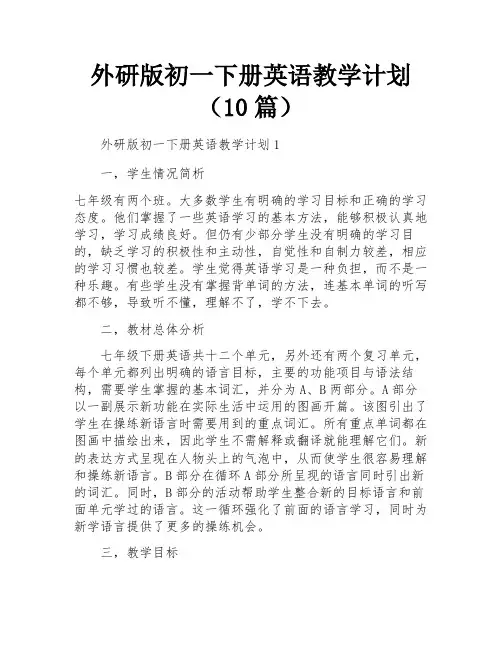
外研版初一下册英语教学计划(10篇)外研版初一下册英语教学计划1一,学生情况简析七年级有两个班。
大多数学生有明确的学习目标和正确的学习态度。
他们掌握了一些英语学习的基本方法,能够积极认真地学习,学习成绩良好。
但仍有少部分学生没有明确的学习目的,缺乏学习的积极性和主动性,自觉性和自制力较差,相应的学习习惯也较差。
学生觉得英语学习是一种负担,而不是一种乐趣。
有些学生没有掌握背单词的方法,连基本单词的听写都不够,导致听不懂,理解不了,学不下去。
二,教材总体分析七年级下册英语共十二个单元,另外还有两个复习单元,每个单元都列出明确的语言目标,主要的功能项目与语法结构,需要学生掌握的基本词汇,并分为A、B两部分。
A部分以一副展示新功能在实际生活中运用的图画开篇。
该图引出了学生在操练新语言时需要用到的重点词汇。
所有重点单词都在图画中描绘出来,因此学生不需解释或翻译就能理解它们。
新的表达方式呈现在人物头上的气泡中,从而使学生很容易理解和操练新语言。
B部分在循环A部分所呈现的语言同时引出新的词汇。
同时,B部分的活动帮助学生整合新的目标语言和前面单元学过的语言。
这一循环强化了前面的语言学习,同时为新学语言提供了更多的操练机会。
三,教学目标1、词汇方面:掌握本册教材中的词汇,学会根据单词的读音规则去记忆单词,掌握单词,词组的用法。
2.语言结构:学会谈论人们的国籍,生活在城市中,询问和表达一个地方的位置,描述动物,表达喜好和陈述理由,学会与他人谈论自己的职业,学会谈论人们正在做的事情,描述和谈论天气,表达自己对天气的喜好和原因,描述某人的外貌,点餐或点菜,表达过去发生的事情,交流对某人,某事,某事的看法等。
3、语法知识方面:掌握一般现在时与现在进行时的构成形式与用法,一般运去时的构成形式与用法,祈使句的用法,情态动词“can"的用法,there be结构的用法,介词的用法。
四,方法与措施1、加强词汇教学。
2、认真贯彻早读制度:规定早读内容,加强监督,保证早读效果。
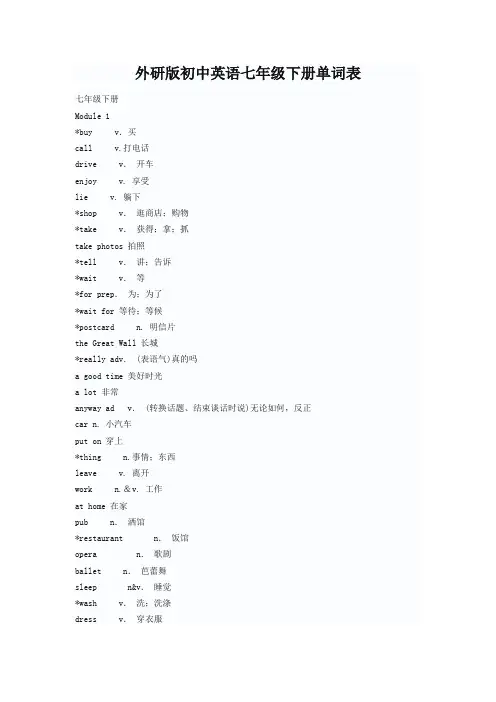
外研版初中英语七年级下册单词表七年级下册Module 1*buy v.买call v.打电话drive v.开车enjoy v. 享受lie v. 躺下*shop v.逛商店;购物*take v.获得;拿;抓take photos 拍照*tell v.讲;告诉*wait v.等*for prep.为;为了*wait for 等待;等候*postcard n. 明信片the Great Wall 长城*really adv. (表语气)真的吗a good time 美好时光a lot 非常anyway ad v. (转换话题、结束谈话时说)无论如何,反正car n. 小汽车put on 穿上*thing n.事情;东西leave v. 离开work n.&v. 工作at home 在家pub n.洒馆*restaurant n.饭馆opera n.歌剧ballet n.芭蕾舞sleep n&v.睡觉*wash v.洗;洗涤dress v.穿衣服*start n&v.开始midday n. 正午*hot dog 热狗coffee n.咖啡see v.探望;看见greeting n.问候;致意at the moment 现在,此时look at 看……*soon ad v.立刻;不久*love n.&v.爱;热爱See you later 再见。
*night n.夜晚good night 晚安(打招呼用语)*street n.街道Module 2festival n.节目Spring Festival 春节ready adj.有准箭的get ready for 为……准备好*clean v.打扫;弄干净*cook v.做饭;烹饪meal n.一餐,一顿饭*learn v.学;学会dragon n.龙dragon dance 舞龙lantern n.灯笼Lantern Festival 元宵节sweep v.打扫sweep away 扫去*floor n.地板*happen V.发生*help v.帮助at work 在工作*tradition n.传统bad adj.坏的;不好的*luck n.运气*paint v.涂;绘域*mean v.意思是;意味decorate v.装饰decc)ration n.装饰paper cut 剪纸everyone pron.每个人;haircut n.理发*give v.给New Year 新年New Year's Eve 新年前夜dumpling n.饺子;团子sweet adj.甜的pudding n.布丁;甜点心fireworks n. (复)焰火few n.小多,很少a few 一些*want v.要;想要*week 星期round adj.圆的ad v.在周围all the year round 一年到头*bring v.带来colour n.颜色*something pron.某事;某物*cut v 剪;切*Christmas n.圣诞节*long adj.长的Module 3*plan n.&v.计划;打算revise v. 温习;复习revise for 温习;复习*picnic n.野餐*have a picnic 吃野餐test n.&v.测试;测验walk up 沿……走;登上*forward adv.向前*look forward to 期待daughter n.女儿granddaughter n.(外)孙女*because conj.因为*plane/pleIn/ n.飞机sightseeing n.游览;观光do some sightseeing 游览*culture n.文化beach n.海滨;海滩*sea n.海;海洋wife n.妻子*cook n.炊事员;厨师*why adv.为什么术foreign adj.外国的get(from…)to… (从……)到达go sightseeing 去观光*cycle v. 骑白行车go cycling 去骑自行年shopping n.买东西;购物go shopping 去买东两;去购物*early adj.&adv.早*out adv.出外;在外go out 外出Module 4*life n.生活;生命future n.将来;未来in the future 在将来;在未来cable TV 有线}U视calculator n.讣钟:器cell phone 移动电话chalk n.粉笔paper n.纸ruler n.直尺satellite TV 卫星电视*no/nou/ adj.没有;尢no one 没有人;无人*farm n.农场*holiday/'holldeff/7.假日;节日*rain n.雨;雨水 v.下雨*weather n.天气wind n.风So conj.因此;所以cheap adj.便宜的fuel n.燃料*expensive adj.昂贵的*short adj.短暂的;短的;矮自*get 变得;得到;拿到get warm 变暖rough adj. (海浪等)汹涌的.(气候)有暴风雨的spring n.舂天autumn n.秋天heavy rain 大雨;暴雨*strong adj.强烈的;强壮的;强大的comfortable/.kAmflobl/adj.舒适的;舒服的heat v.加热machine n.机器dull adj.单凋的;枯燥的job n.工作free adj.自由的climate n.气候technology n.科技;技术transport n.运输*easy adj.容易的interesting adj.有趣的*difficult adj.困难的smooth adj.平静的;平稳的uncomfortable adj.不舒服的weak adj.弱的*dream n.梦想Module 5hometown n.故乡;家乡*than conj (用于形容词、副词的比较级之后)比*east adj.东方的 n. 东方*south adj.南方的 n.南方kilometer n.千米;公*metre n.米*high adj.高的million num. 百万*busy adj.忙的;繁忙的*coast n.海岸*hill n.小山;丘陵*island n.岛屿population n.人口answer v.回答 n.回答;答案*question n.问题 V.提问;询问*north n.北方 adj.北方的*west n.西方 adj.西方的*river n.河;江church n.教堂*famous adj.著名的*capital v.首都;省会*lake n.湖low adj.低的*mountain n.山;山脉*about adv.大约;几乎.prep.关于*near/mo/prep.靠近;接近village n.村庄region n.地区;区域*wide aaj.宽的*fact n.事实;细节Module 6Olympic adj.奥林匹克的*adventure n.激动人心的活动;冒险more adj.更多的 adv.更*dangerous adj.危险的gymnastics n.体操ski v.滑雪*popular adj.流行的;受欢迎的*exciting adj.激动人心的tiring adj.累人的unpopular adj.不流行的,不受欢迎的boring adj.令人厌烦的relax v. (使)放松relaxing aaj.放松的;轻松自在的safe adj.安全的be good at 擅长neighbourhood n.居住区;邻近地区;邻里关系committee n.委员会arrive v.到达late adv.迟;晚于规定时刻 adj.迟的;晚的back n.后面;后部however adv.可是;然而*slowly adv.慢地loudly adv.大声地;吵闹土眭clearly adv.清楚地visitor n.游客;观光者*need v.& modal v.需要*quickly adv.快地*well adv.好地badly adv.坏地;糟糕地carelessly adv.粗心地;马虎地*better adj.&adv.更好*hard adv.努力地*take around领(某人)四处参观cassette n.盒式磁带player n.播放机vocabulary n.词汇carefully adv.认真地quietly adv.安静地continue v.继续until prep.直到……时;到……为止Module 8*past adj.&n.过去(的)prep.超过……was 动词be(am,is)的过去式*born (动词bear/beo/的过去分词)出生be born 出生于founder n.创建者scientist n.科学家professor n.教授were 动词be(are)的过去式strict adj.严格的;严厉的*nice adj.友好的;令人愉快的friendly adj.友好的*naughty adj.淘气的primary adj.初等的;初级的primary school 小学well-behaved adj.有礼貌的,循规蹈矩的hey int.嘿;喂province n.省;省份Mrs n.夫人;太太president n.总统*with prep.带有;和……在一起movie n.电影*baseball n.棒球living room 起居室*kitchen n.厨房bathroom n.浴室bedroom n.卧室wall n.墙poster n.招贴画;海报garden n.花园*pond n.池塘*fish n.鱼;鱼肉back adv.回(原处);向后go back 回去somewhere n.某处;某个地方unfriendly adj.不友好的partner n.搭档;同伴character n.性格Module 9*once adv.曾经;一度once upon a time (常用作讲故事的开头语)从前*bear n.熊*begin v.开始*decide v.决定*ride n.&v.骑(马;车等)go for a ride 去乘(骑……)golden adj.金黄色的*little adj.小的;矮小pick v.采摘notice v.注意到*hurry v.&n.赶忙;匆忙knock v.敲nobody pron.没有人;无人push v.推*open adj.敞开的 V.建立;开;打开*count v.数bowl n.碗pick up 捡起all adj.全部的 adv.全部地hungry adj.饿的rush v.冲;奔try v.尝试destroy V.毁坏;破坏unhappy adj.不高兴的asleep adj.睡着的*return v.返回;归还cry v.哭;喊叫point v. (用手指等)指without prep.无;没有look around 向四周看die v.死change into 变成emperor n.皇帝Module 10January n. 1月February n. 2月March n. 3月April n.4月May n. 5月June n. 6月July n. 7月August n.8月September n. 9月October n. 10月November n. 11月December n. 12月go away 走开;离开actor n. (男)演员writer n.作家play n.戏剧poem n.诗歌age n.年龄at the age of 在……岁时marry v.结婚move v.搬(家);移动join v.参加;加人company n.剧团;公司become v. (过去式became)成为successful adj.成功的rich adj. 富有的*snow v.下雪 n.雪Module 11*national adj.民族的;国家的hero n.英雄bridge n.桥build v.(过去式built)建造engineer n.工程师government n.政府*museum n.博物馆patriotic adj.爱国的railroad n.铁路tunnel n.隧道Russian adj.俄国的;俄国人的,俄语的 n.俄国人;俄语through prep.从一端到另一端,穿越go through穿过*over prep.在……的上面astronaut n.宇航员flag n.旗,旗帜space n.太空;空间wave v.挥手(致意)spacecraft n.宇宙飞船headline n.标题*news n.新闻background n.背景资料ago adv.以前pilot n.飞行员son n.儿子orbit v.绕轨道运行 n.轨道reach v.到达altitude n.高度;海拔flight n.飞行;航程*last v.持续land v.着陆 n.陆地safely adv.安全地third num.第三person n.人air force 空军*programme n.项目; (电视)节目rest v.&n.休息husband n.丈夫date n.日期*middle n.&adj.中间(的)end n.&v.结尾;结束Module 12spend v.(过去式spent)花费(时间、金钱)*hope v.&n.希望on holiday在度假;在休假*clock n.时钟;计时器do some shopping买东西;购物*tomorrow n.明天 adv.在明天gran n.<主英口>奶奶;外婆[granny的缩略]Revision module Bplay with和……一起玩*meaning n.意义;意思。
七年级下外研版英语第二学期期中测试题 一、单项选择: ( ) 1. What _____ he _____ now? He _____ a book. A. is…doing…watching B. does…do…are reading C. is…doing…is reading D. do…doing…reading ( ) 2. Let _____ go home _____ 8:00. A. they…at B. them…at C. they…on D. them…on ( ) 3.He wants _____ at the pool. But now he _____ his homework. A. to swim…is doing B. swimming…is doing C. to swim…does D. swimming…doing ( ) 4. What is he waiting _____? A. for B. in C. at D. from ( ) 5. He likes _____ TV. A. reading B. watching C. seeing D. looking at ( ) 6. This _____ my brother, Scott. He’s playing _____ soccer. A. is…a B. is…the C. are…/ D. is…/ ( ) 7. Here _____ your books. A. is B. are C. be D. / ( ) 8. _____ photo, I’m swimming _____ the pool. A. In second…at B. At second…at C. In the second…at D. At the second…in ( ) 9. _____ you for your help. A. Thank B. Thanks C. To thank D. Thanks’ ( ) 10. _____ do you usually go to bed? _____ 9:00 o’clock. A. Where…at B. When…at C. How…in D. What…in . ( )1 1. Everyone _____math hard in our .team. A. studys B. study C. studies D. studying ( )12. Our PE teacher ________ a ball ________ teach us a new game. A. uses, with B. use, for C. using, to D. uses, to ( )13. There will be at least one car ______ every family______ the future. A. in, on B. in, in C. at, for D. to, at ( )14. —Will there be newspapers in the future?—No, there _______. A won’t. B. isn’t C. won’t be D. will be not ( )1 5. —Will they send their messages_____friends _____ email?—Yes, they will. A. for, by B. at, with C. to, by D. by, to ( )1 6. Tom’s family is ______ a picnic. A. have B. having C. has D. had ( ) 17. No one will be cold and there will be ______sunshine. A. many B. lot of C. lots of D. a lot ( )1 8. There will be _____ rain and ______ winds. A. heavy, strong B. large, big C. big, heavy D. strong, big ( ) 19. There will _____ lots of rain in the next year. A. have B. be C. has D. is ( ) 20. —______ are you going to do this summer holiday? —I’m going to visit my grandparents. They live in America. A. When B. How C. What D. Where ( ) 21. This is ________study. It’s nice and comfortable. A. Lucy and Lily B. Lucy’s and Lily’s C. Lucy’s and Lily D. Lucy and Lily’s ( ) 22 We can see ______ sun in the daytime and ______ moon in the night. A. a, a B. an, an C. the, the D. a, the ( ) 23. —My grandfather is ill. — ________ . A. Sorry B. Excuse me C. That’s too bad D. I’m sorry to hear that ( ) 24. “Look! This shirt is beautiful.” “________?” A. Why not try on it B. Why not trying it on C. Why not try it on D. Why not trying on it ( ) 25. “What will the future ______?” “No one uses a pen.” A. be like B. be C. like D. like as ( ) 26. There ______ going to ______ three parties this holiday. A. be: be B. is; be C. are; be D. are; are ( ) 27. Please look ______ your little brother. A. at B. for C. like D. after ( ) 28. Let’s _____ home. A. goes B. go C. to go D. going ( ) 29. We use the money ______ a second-hand car. A. buy B. to buy C. buying C. buys ( ) 30. The Blacks ______ a football match at this moment. A. watching B. are going to watch C. is watching D. are watching ( ) 31. — Linda, when shall we take a walk? —After I finish my homework. A. check B. check C. to check D. checking ( ) 32. Behind the door _________ some apples. A. is B. are C. be D. / ( ) 33. —Can I help you, madam? —I’d like a kilo of ________ . A. milk B. cake C. banana D. apple ( ) 34. School ________. Let’s go home. A. begins B. is off C. is over D. is over there ( ) 35. —________ is your new bike? —1,000 yuan. A. How many B. How much C. How about D. Where ( ) 36. Do you read English ________? A. every morning B. in morning C. on every morning D. in every morning ( ) 37. Mrs. Green comes from ________. A. English B. American C. Australia D. Japanese ( ) 38. It ________her three weeks to study lessons. A. spends B. cost C. waste D. takes ( ) 39. I will go to the hospital this afternoon. There is_______ with my nose. A. nothing wrong B. wrong nothing C. anything wrong D. something wrong ( ) 40. I think Dick can ________ his camera in the lost and _______ office. A. find, find B. finds, finds C. find, found D. found, find ( ) 41. There are many phones _____ the lost and found office at the airport. A. in B. / C. on D. at ( ) 42. How much does Mr Black ________ for this computer ? A. take B. spend C. pay D. cost ( ) 43. He shopping on line, but today he doesn’t do it. A. likes, likes to B. likes, like to C. like, likes to D. like, like to ( ) 44. He my book everywhere. At last, he it under his bed. A. look for, finds B. look for, find C. looks for, find. D. looks for, finds. ( ) 45.My father can ____ French wonderfully. He works there for ten years. A. speak B. say C. talk D. tell ( ) 46. Let’s go to the airport! The plane __________ in an hour. A. leaves B. will leave C. going to leave D. leave ( ) 47. Whose are these gloves? Are they __________? A. Rose and Betty B. Rose and Betty’s C. Rose’s and Betty D. Rose’s and Betty’s ( ) 48. The two girls_____ late yesterday. A. are all B. all are C. are both D. both are ( ) 49. It is bad for children to eat _______ . A. much too food B. too much food C. much too foods D.too much foods ( ) 50. Would you like ______cup of coffee? A. other B. the other C. another D. the one ( ) 51. Will your brother ______ to Australia next week? A. get B. arrive C. reach D. get to ( ) 52. Our school is very tidy, you can see ________ litter in it. A. few B. a few C. little D. a little ( ) 53. “Look! The red one is beautiful. Let me ________.” A. try on it B. try it on C. trying it on D. to try on it ( ) 44. The boy _____ buy his school things on line. A. able to B. are able to C. is able D. is able to ( ) 45. You can ____ at the post office and _____ at Blue Sea hotel. A. gets on, gets off B. get off, get on C. get on, get off D. gets off, gets on